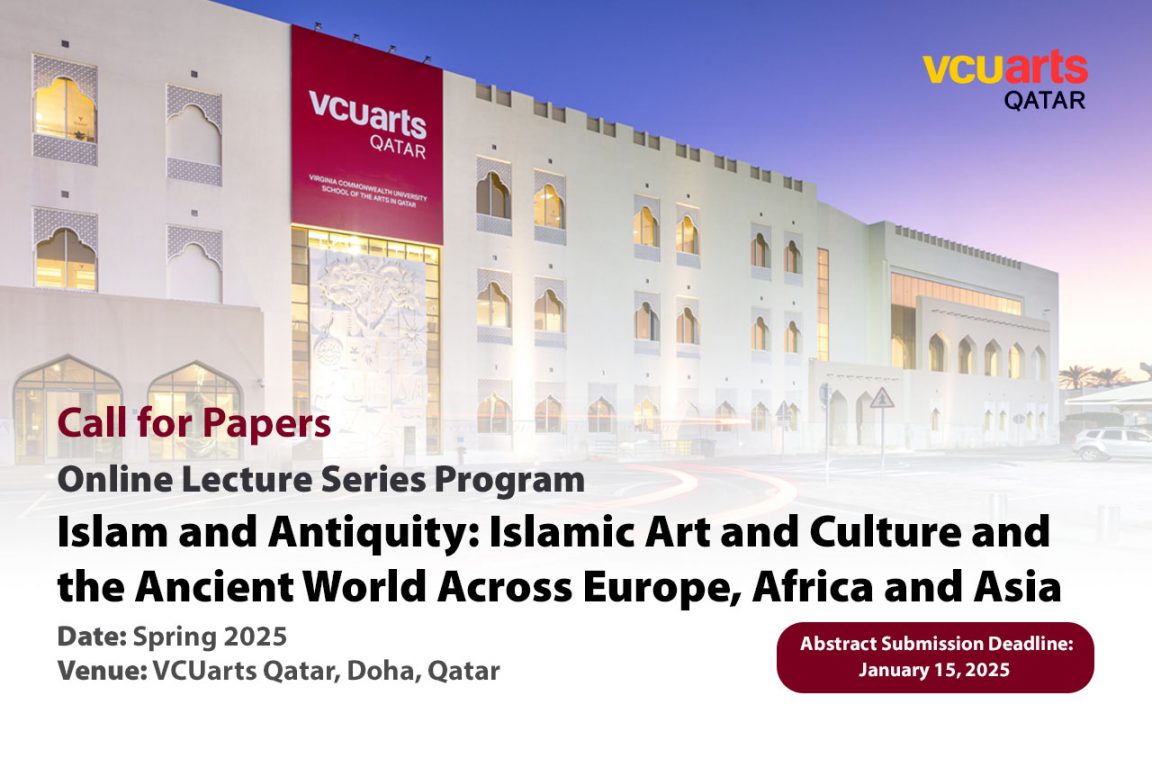Islam and Antiquity: Islamic Art and Culture and the Ancient World Across Europe, Africa and Asia

About The Event
Islam and Antiquity: Islamic Art and Culture and the Ancient World Across Europe, Africa and Asia
Call for Papers
Online Lecture Series Program
Date: Spring 2025
Venue: Online
Organizer: Virginia Commonwealth University School of the Arts Qatar, Doha, Qatar
Abstract Submission Deadline: January 15, 2025
This online lecture series explores how Muslims across diverse geographies and chronologies have engaged with the material legacies of ancient and pre-Islamic societies, from the beginning of the Islamic era to the present. They seek to examine the diverse ways in which Islamic communities, including scholars, and religious and political authorities, have valued and interacted with the material, visual, and ideological culture of past civilizations. The contributions will explore a range of issues, from the preservation and collection of antiquities to the complex dynamics of iconography and iconoclasm, the transfer of methods and ideas, providing a deeper understanding of how Muslims have understood and engaged with ancient legacies over time.
The organizers welcome papers from scholars at all levels of their careers that address, but are not limited to, the following themes:
- The Role of Ancient and Pre-Islamic Artifacts in Islamic Thought: How have material and immaterial remains, and the memory of ancient civilizations been preserved, studied, and integrated into Islamic intellectual traditions, from early Islamic historiography to modern archaeology?
- Iconography and Material Culture in Muslim Contexts: How have images, symbols, and material objects from ancient and pre-Islamic societies been interpreted, appropriated, or rejected in Islamic visual culture? What role does ancient iconography play in the making of Islamic art and architecture?
- Framing of Islamic Identity in Relationship to Dimensions of Antiquity: How have ancient histories, sites, and artifacts served to define and construct Islamic identity and historical consciousness?
- Islamic Archaeology and Heritage Preservation: A critical examination of the practices of collecting, preserving, and interpreting ancient material culture in Muslim-majority regions. How have these practices shifted over time, and what tensions exist between conservation, commercialization, and cultural preservation?
- The Destruction and Appropriation of Antiquities: How have Islamic movements—whether political, theological, or cultural—confronted the issue of destroying or preserving pre-Islamic material heritage? How can destruction be the basis for the creation of new forms and ideas? What are the implications of iconoclastic acts for broader cultural and religious narratives?
- The Politics of Collections and Museums: How have collections of antiquities in Islamic contexts shaped the understanding of ancient civilizations? What role have Islamic rulers, scholars, and institutions played in the creation and display of such collections? What tensions arise in the global circulation of these objects?
- Materiality and the Sacred: The significance of material objects, from relics to monuments, in creating connections between the past and the present in Muslim societies. How do material objects function as mediators of memory, spirituality, and historical continuity?
“Islam and Antiquity” aims to provide a multifaceted view of how Muslims have interacted with the legacies of the ancient world—seeing them not only as historical artifacts but as active agents in shaping Islamic intellectual and cultural life. In addition to this Spring 2025 online lecture series, They hope to develop a more lasting community of colleagues, the beginning of a research group that will provide the opportunity for interaction on an ongoing basis and in a multidisciplinary environment. They hope to organize physical meetings beyond these online lectures where They can discuss the subject in more depth. They are also thinking of an edited volume to disseminate their findings.
Submission Guidelines
- Abstracts (300-500 words) should be submitted by 15 January 2025.
- Presentations are expected to be delivered online twice a month between March and May 2025 with dates to be announced. Each paper should be 40 minutes in length with 20-30 min for discussion.
- Abstracts and inquiries should be sent to islamicartandantiquity@gmail.com.
- The organizers look forward to your contributions to this important and timely exploration of the intersections between material culture, history, and identity in the Islamic world.
Source: Architexturez South Asia


We're always eager to hear from you.
If you’d like to learn more about us or have a general comments and suggestions about the site, email us at